
POPULATION ECOLOGY
Scope & Guideline
Fostering innovation in the study of population interactions.
Introduction
Aims and Scopes
- Population Dynamics and Modeling:
Research on the dynamics of populations, including mathematical and statistical modeling techniques to understand growth patterns, viability, and interactions within and between species. - Demographic Studies:
Examination of demographic parameters such as age structure, reproduction rates, and survival strategies, often in relation to environmental and anthropogenic changes. - Ecological Interactions:
Analysis of interspecific and intraspecific interactions, including competition, predation, and mutualism, to understand their effects on population structures. - Conservation and Management:
Focus on conservation strategies and population management practices for endangered species and ecosystems, addressing challenges posed by habitat loss and climate change. - Genetic Diversity and Structure:
Investigation into the genetic makeup of populations to assess diversity, structure, and the effects of fragmentation and isolation. - Impact of Environmental Change:
Research on how environmental factors such as climate change, habitat alteration, and anthropogenic activities influence population dynamics and community structures.
Trending and Emerging
- Integration of Genomic Data:
There is an increasing trend in the use of genomic data to inform population dynamics and conservation strategies, highlighting the importance of genetic diversity in resilience and adaptation. - Impact of Climate Change:
Research addressing the effects of climate change on population dynamics is gaining prominence, reflecting the urgent need to understand how shifting environmental conditions affect species survival. - Interdisciplinary Approaches:
Emerging studies are increasingly interdisciplinary, combining ecology with fields such as epidemiology and socio-economics to address complex issues like disease management and conservation. - Adaptive Management Strategies:
There is a growing focus on adaptive management in conservation practices, emphasizing the need for flexible strategies that can respond to changing ecological conditions. - Community Dynamics and Interactions:
Studies examining community assembly, species interactions, and their implications for biodiversity are trending, reflecting an interest in understanding ecological networks rather than isolated species.
Declining or Waning
- Traditional Species-Specific Studies:
There is a noticeable decline in studies focusing solely on individual species without broader ecological implications, as the journal shifts towards more integrative approaches that consider community dynamics. - Basic Ecological Descriptions:
Papers that primarily describe ecological phenomena without applying advanced modeling or statistical analysis are becoming less common, indicating a trend towards more rigorous methodologies. - Historical Population Studies:
Research focusing on historical population data is less frequent, suggesting a movement towards contemporary studies that assess real-time dynamics and immediate environmental impacts. - Purely Theoretical Models:
The use of purely theoretical models without empirical validation is declining, as there is a stronger emphasis on models that incorporate real-world data and applications. - Single-Factor Analyses:
Studies that analyze the effects of a single factor on population dynamics are decreasing, as researchers increasingly adopt multifactorial approaches to capture the complexity of ecological interactions.
Similar Journals
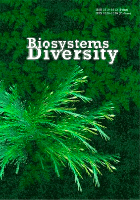
Biosystems Diversity
Connecting Scholars in the Quest for BiodiversityBiosystems Diversity is an esteemed open access journal published by the Oles Honchar Dnipro National University since 2009, based in Ukraine. Focusing on a wide array of topics within the fields of Ecology, Evolution, Behavior, and Systematics, the journal aims to foster the dissemination of cutting-edge research and innovative methodologies in understanding biodiversity and ecological interactions. With its ISSN 2519-8513 and E-ISSN 2520-2529, Biosystems Diversity has seen a consistent growth trajectory, earning a Q3 category for Ecology and a Q4 classification for Ecology, Evolution, Behavior and Systematics as of 2023, reflecting its dedication to high standards of scholarly excellence. The journal's rankings in Scopus solidify its relevance in the academic community, providing researchers and practitioners with vital insights into contemporary environmental challenges. As it converges towards its 2024 target, Biosystems Diversity continues to empower scientists, students, and professionals alike to explore new dimensions in the study of biological systems, offering crucial open access options for broader reach and engagement.

Redia-Journal of Zoology
Unveiling the mysteries of the animal kingdom.Redia-Journal of Zoology, published by the CRA-Research Centre Agrobiology & Pedology in Italy, is a distinguished academic journal dedicated to advancing the field of zoological studies through high-quality research and insightful reviews. With an ISSN of 0370-4327, this journal provides a platform for scholars and practitioners in the Agricultural and Biological Sciences to disseminate their findings and engage in meaningful discourse. Recognized in the 2023 Scopus rankings as Q2 in its category, Redia occupies a notable position within the global research community, ranked 138 out of 221 in Agricultural and Biological Sciences. The journal has a commitment to publishing original research from 2011 until 2024, contributing to the body of knowledge in diverse sub-disciplines of zoology, ecology, and conservation. While currently not open access, Redia strives to foster collaboration and discussion among researchers, making it a vital resource for advancing zoological sciences.

ENVIRONMENTAL BIOLOGY OF FISHES
Advancing knowledge in aquatic ecosystems.ENVIRONMENTAL BIOLOGY OF FISHES, published by SPRINGER, is a premier journal in the fields of Aquatic Science and Ecology, Evolution, Behavior and Systematics. With a rich history spanning from 1976 to 2024, this esteemed journal provides a platform for groundbreaking research that addresses critical issues such as fish ecology, species behavior, and environmental influences on aquatic life. Recognized for its significant contributions, it holds a Q2 ranking in both the Aquatic Science and Ecology categories, reflecting its influence and relevancy in the academic community. The journal's focus on innovative ecological studies makes it an essential resource for researchers, professionals, and students dedicated to advancing our understanding of fish biology and the broader ecological systems of which they are a part. Although not an open-access publication, the insights and findings presented in its articles are invaluable for those engaged in the preservation and sustainable management of aquatic environments.
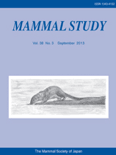
MAMMAL STUDY
Connecting researchers to promote mammalian science and ecology.Mammal Study, published by the Mammalogical Society of Japan, is a leading academic journal dedicated to the field of mammalogy and related biological sciences. Since its inception, it has provided a critical platform for researchers, professionals, and students to share their findings and insights into the diverse facets of mammalian biology, ecology, and conservation. The journal, with ISSN 1343-4152 and E-ISSN 1348-6160, is recognized for its rigorous peer-review process and has attained a commendable Q3 ranking in the 2023 category of Animal Science and Zoology. With an impact factor reflecting its growing influence—ranking 283 out of 490 in Scopus—we welcome contributions that advance the understanding of mammalian species and their habitats. While access to published articles is through traditional channels, the journal aims to reach an even wider audience by fostering greater awareness and appreciation for mammalian research and conservation efforts. The Mammal Study has converged years of insightful publications from 2008 to 2024, solidifying its position as a vital resource in the biological sciences.
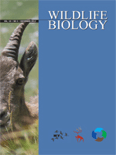
WILDLIFE BIOLOGY
Uniting researchers for a sustainable future in wildlife biology.WILDLIFE BIOLOGY is a prestigious open-access journal published by WILEY, dedicated to the dissemination of high-quality research in the fields of ecology, evolution, behavior, and conservation. With an impressive Impact Factor indicative of its scholarly relevance, the journal has been a cornerstone for researchers since its inception in 1995, now extending its convergence through 2024. Recognized within the top Q1 and Q2 quartiles across various categories—including Ecology, Evolution, Behavior and Systematics and Management, Monitoring, Policy and Law—this journal plays a crucial role in fostering knowledge and promoting effective solutions in wildlife biology. The journal serves a diverse audience, offering robust access options since 2014, ensuring that vital research is freely available to professionals, researchers, and students alike. With its base in Denmark, the journal encourages contributions that address pressing wildlife management issues and informs policy development, further cementing its significance in the ecological research community.
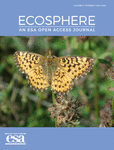
Ecosphere
Exploring the intricate web of life and its systems.Ecosphere is a leading open-access journal published by WILEY, dedicated to advancing research in the fields of ecology, evolution, behavior, and systematics. Established in 2010 and headquartered in the United States, this innovative journal provides a platform for the exchange of cutting-edge scientific knowledge and discovery, fulfilling its mission to enhance our understanding of ecological systems and their interactions. With a prestigious impact factor reflecting its commitment to high-quality research, Ecosphere is ranked Q1 in both Ecology and Ecology, Evolution, Behavior, and Systematics for 2023, further solidifying its prominence in the scientific community. The journal's scope includes a wide array of topics related to environmental science, making it an essential resource for researchers, professionals, and students aiming to stay at the forefront of ecological research. It offers comprehensive open access options, ensuring that groundbreaking findings are readily available to a global audience, thus fostering collaboration and innovation in the field.
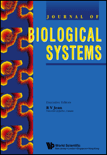
JOURNAL OF BIOLOGICAL SYSTEMS
Advancing interdisciplinary insights in biological systems.Journal of Biological Systems is a prestigious journal published by World Scientific Publishing Co. Pte Ltd that serves as a vital platform for interdisciplinary research in the domains of agricultural and biological sciences, applied mathematics, and ecology. With its inception in 1996 and converging insightful contributions up to the present, the journal showcases innovative research that influences both theoretical and practical aspects within these critical fields. Its commendable Q2 category rankings in 2023 highlight its commitment to high-quality scholarship, achieving rankings of #62 in Agricultural and Biological Sciences, #243 in Applied Mathematics, and #204 in Ecology on the respected Scopus index. While the journal maintains a traditional publishing model, its rigorous peer-review process ensures that it meets the highest academic standards. The Journal of Biological Systems is essential reading for researchers, professionals, and students keen to keep abreast of the latest developments and methodologies impacting ecological systems, mathematical applications, and biological innovations.
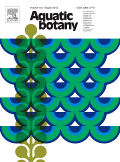
AQUATIC BOTANY
Nurturing the future of aquatic science.Aquatic Botany, published by Elsevier, stands as an influential scholarly journal in the fields of Aquatic Science and Plant Science. Established in 1975, this esteemed journal has maintained a strong commitment to advancing our understanding of aquatic plant life, providing a platform for high-quality research that contributes to both ecological awareness and the sustainable management of aquatic ecosystems. With its impact factor reflecting a commendable ranking in the Scopus database—#169 in Plant Science and #95 in Aquatic Science—it is recognized for its valuable contributions to the scientific community, evidenced by its Q2 quartile ranking in both categories as of 2023. The journal does not currently offer open access, ensuring rigorous review and scholarly integrity while being accessible through institutional subscriptions. Set against the backdrop of the Netherlands, Aquatic Botany continues to be a vital resource for researchers, professionals, and students looking to explore the complex interactions between aquatic flora and their environment, aiming to inspire innovative ideas and practical solutions for aquatic conservation and management.
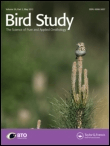
BIRD STUDY
Advancing avian knowledge for a sustainable future.BIRD STUDY, an esteemed journal published by Taylor & Francis Ltd, stands at the forefront of avian research, contributing significantly to the fields of ecology, evolution, behavior, and conservation. With its ISSN 0006-3657 and E-ISSN 1944-6705, this journal has been a cornerstone of ornithological studies since its inception in 1954 and continues to provide a critical platform for the dissemination of knowledge through 2024 and beyond. It holds a respectable Q3 quartile ranking in both Ecology, Evolution, Behavior and Systematics and Nature and Landscape Conservation, reflecting its pivotal role in the academic community. While the journal is not open access, it continues to attract submissions from a diverse array of researchers and professionals eager to share their findings on the intricate and dynamic interactions of birds within their ecosystems. As the global focus on biodiversity and conservation intensifies, BIRD STUDY remains dedicated to fostering knowledge and encouraging evidence-based practices that aim to protect avian species and their habitats.
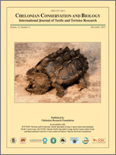
CHELONIAN CONSERVATION AND BIOLOGY
Championing the science of turtle and tortoise preservation.Chelonian Conservation and Biology is a distinguished academic journal dedicated to advancing the field of chelonian research, encompassing conservation, ecology, and biology of turtles and tortoises. Published by Allen Press Inc in the United States, this journal is well-regarded within the realm of Animal Science and Zoology, as well as Ecology, Evolution, Behavior and Systematics, holding a commendable Q3 ranking in both categories for 2023. With an ISSN of 1071-8443 and an E-ISSN of 1943-3956, the journal features a diverse range of articles aimed at professionals, researchers, and students, fostering an understanding of the critical challenges facing chelonians worldwide. Although not an open-access publication, Chelonian Conservation and Biology provides high-quality content, including original research, reviews, and case studies, encouraging engagement and collaboration among experts. With coverage extending from 2006 to 2024, the journal serves as a vital platform for disseminating knowledge and promoting conservation efforts essential to the survival of these remarkable species.